Previously in our deep dive retrospective, Nathaniel visited Lucy Honeychurch at her idyllic pastoral home in England and her new engagement to Cecil Vyse, whose sneering fastidiousness is only matched by his complete inability to relate normally to other people. Things got delightfully complicated when the Emersons turned up unexpectedly as neighbors. They’re about to get a lot more complicated in part 3, with Charlotte Bartlett, of all people, emerging as the unsung savior of truth, beauty, and love.
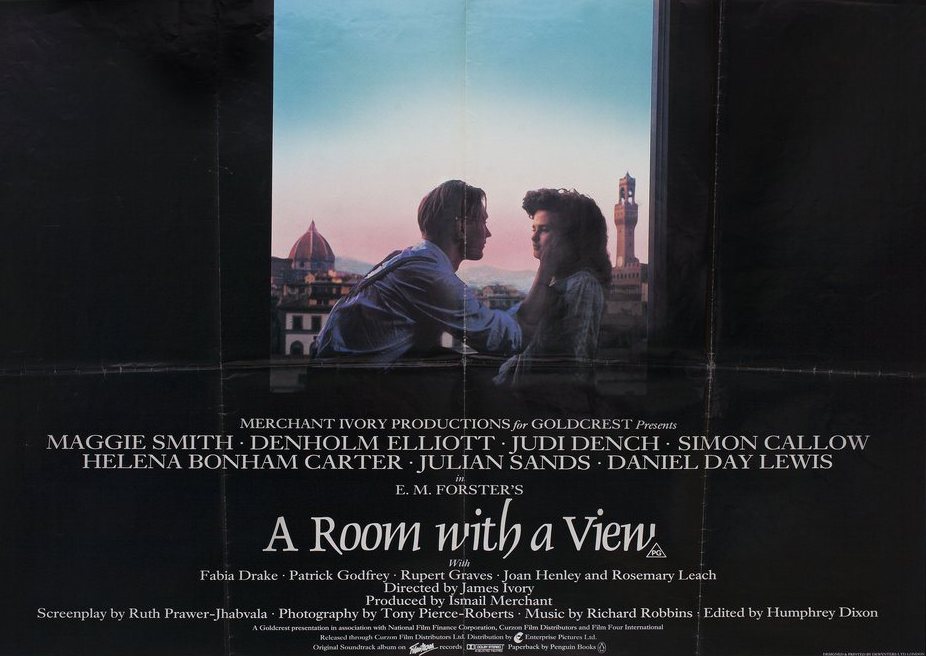
A ROOM WITH A VIEW
(a three part miniseries)
part 3 by Lynn Lee
I’ll be honest: although A Room With a View is one of my all-time favorites, for a long time the third act was my least favorite. Too much lying and denial by Lucy, too much drawing out of the inevitable, not enough humor to make it go faster. But as I grew older, I came to see it differently. If the first act is the most romantic and the second the most comedic, the third is – pardon my French – when shit gets real. We see the emotional consequences of our heroine trying to bury what’s in her heart, and in so doing we get to see her finally grow up.
1:18:26 First-time viewers may not know it yet, but the library book Lucy’s mother admonishes her to pick up is a narrative grenade...

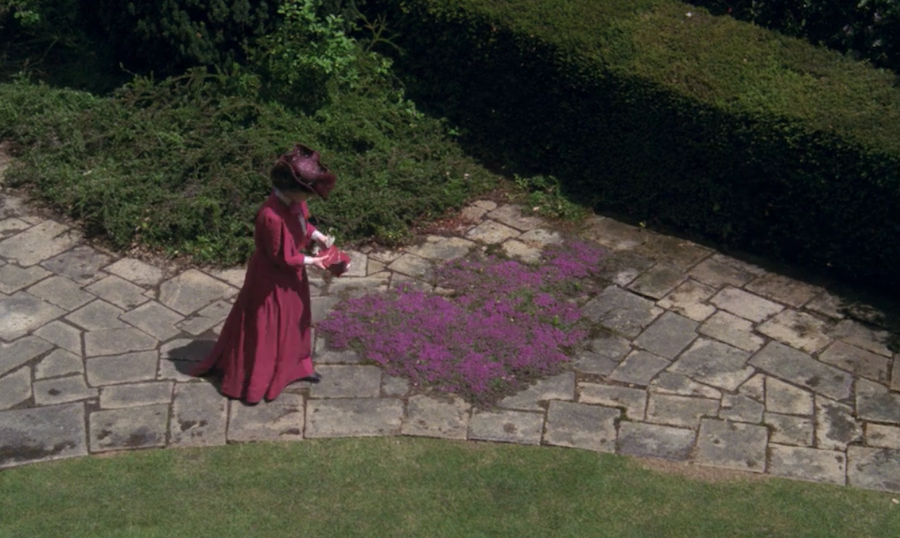
Fittingly, its cover is bright red – a red that matches or at least rhymes with Lucy’s dress. In the book, the dress is described as a sartorial failure, and this rendition isn’t especially flattering. But it’s also the only time in the movie we see Lucy wearing red, and in retrospect serves as a pretty good premonition of the fire that’s about to be (re)ignited.
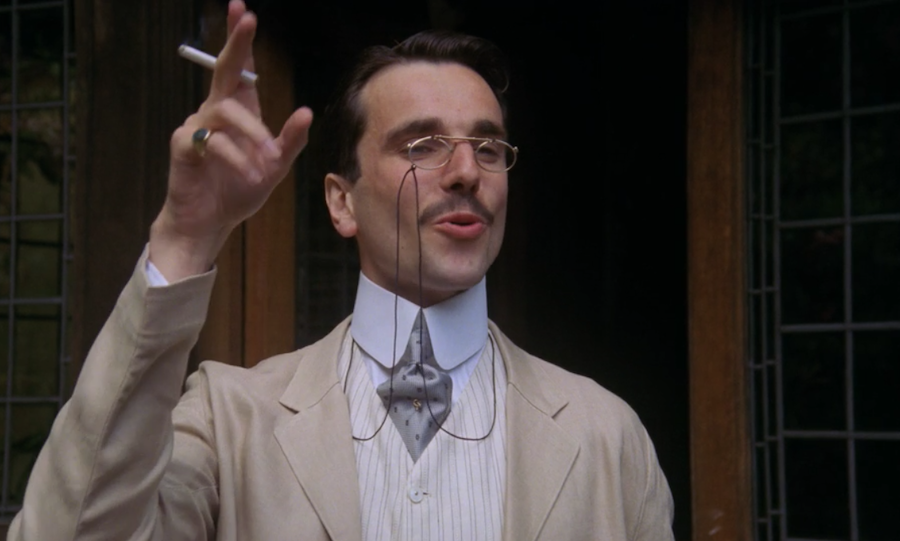
1:19:17 Another premonition: Cecil’s insufferably arch “Goodbye; be good!” as Lucy drives off with her mother and Charlotte, and Lucy’s side-eye in response. It’s a look that says “Why am I with this clown?” even though she’s not ready to admit that thought to herself.
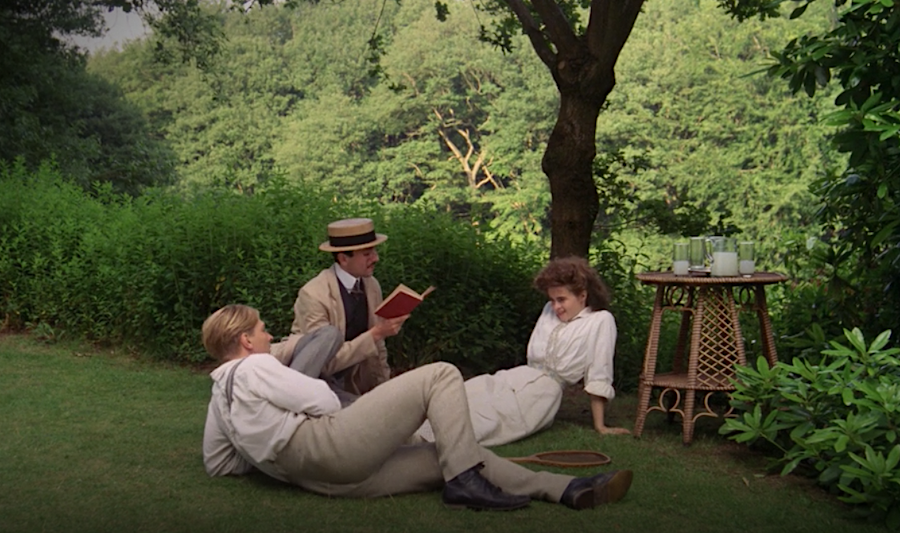
1:20:29 Back at Windy Corner, the Honeychurch home, a spirited game of tennis doubles unfolds between Lucy, Freddy, Floyd, and George, Cecil struts back and forth on the sidelines while reading passages from that red book that he finds particularly ludicrous. No one pays him any mind until the game is over and he calls Lucy over. George joins them, making for an awkward yet picturesque trio – one of several tableaux that look like a painting by Renoir, or perhaps Manet.
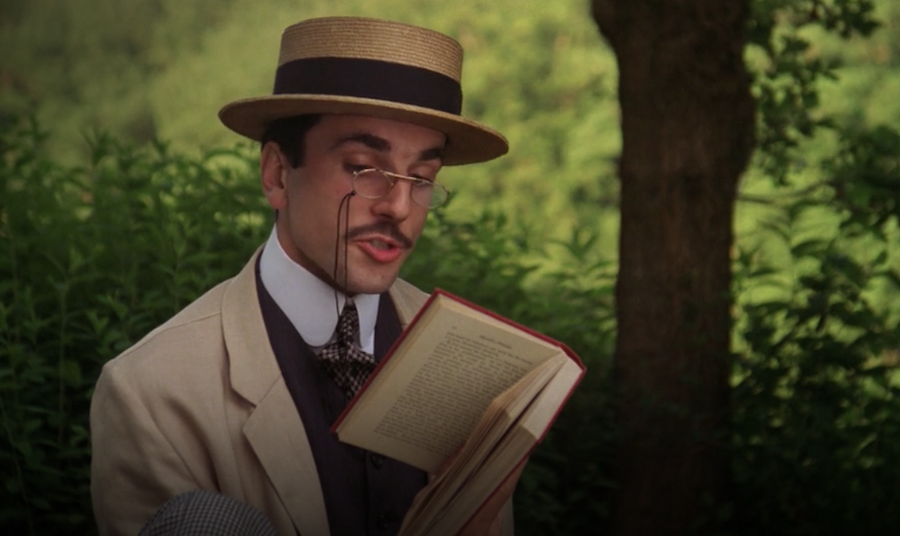
'Under a Loggia' by... Elena Laveesh
1:20:47 The sexual tension between Lucy and George is so palpable as they banter that even clueless Cecil seems to subconsciously sense and resent it. He attempts to reclaim Lucy’s attention by drawing it back to the book he’s reading, a romance novel set in Italy. This backfires as Lucy notices for the first time that the novel is by Eleanor Lavish (whose name Cecil of course gives an affected mispronunciation), leading her to reminisce with George about Italy and views, both physical and metaphysical.
1:22:12 And then! At Cecil’s bidding, Lucy opens the book, finds a passage that hits her like a slap in the face – and the grenade is launched.
'Afar off the towers of Florence, and she wandered as though in a dream through the wavering golden sea of barley...'
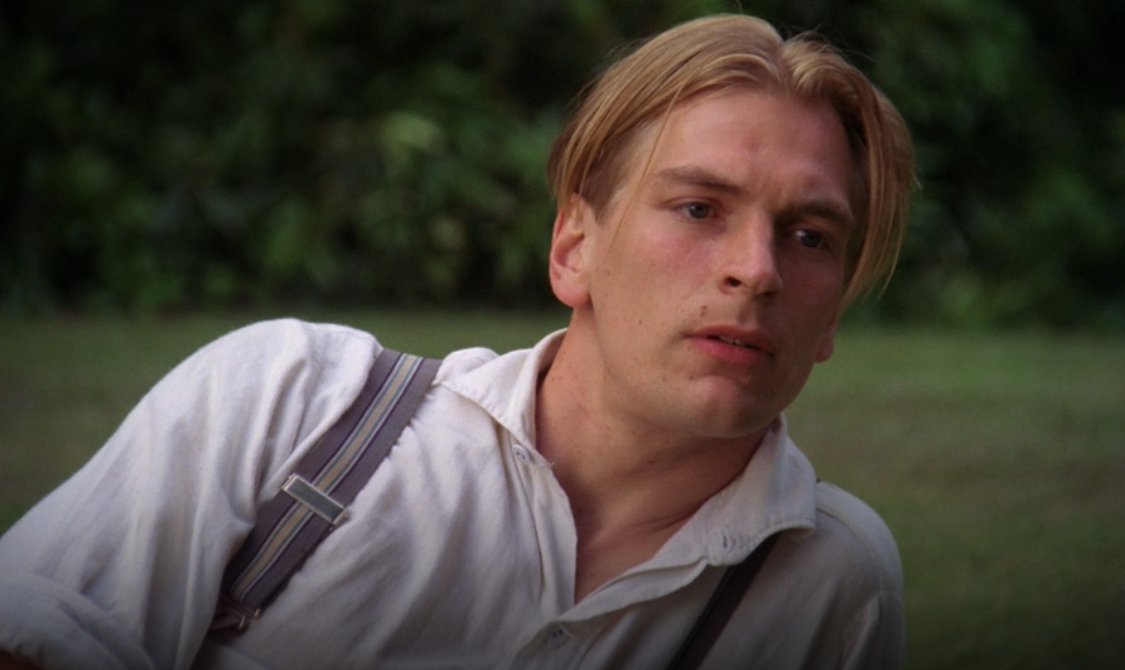
Isn't it a mortal?! 'There came from his lips no wordy protestations. No eloquence was his, nor did he suffer from the lack of it. He simply enfolded her in his manly arms'
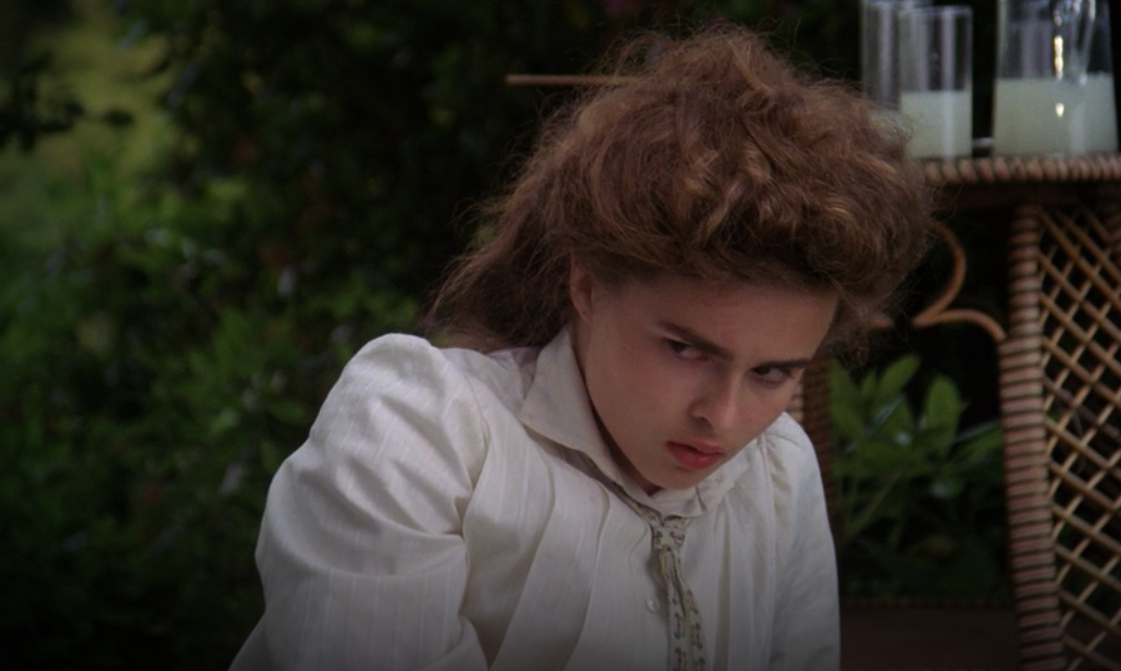
The most momentous event of George and Lucy’s lives resurfaces, reduced to the clichéd prose of a bad romance novel, mockingly read aloud to them by Lucy’s current fiancé. If this is fate, she sure has a perverse sense of humor.
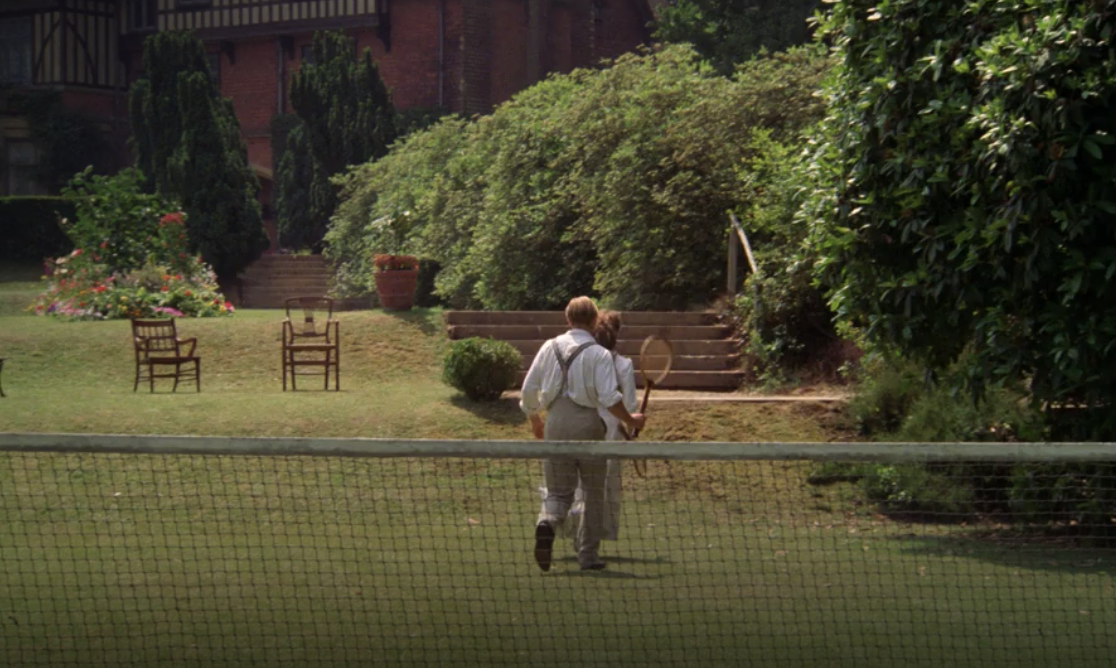
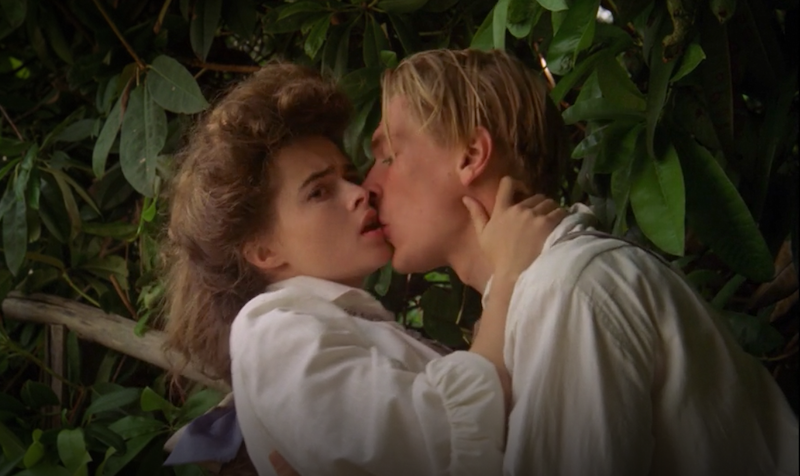
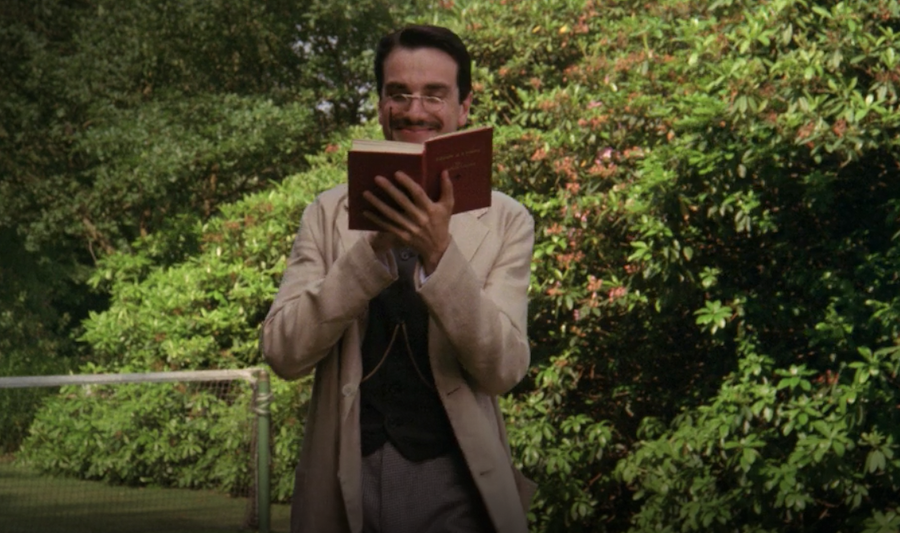
1:23:00 In one of my favorite non-verbal sequences of the movie, a mortified Lucy retreats to the house and George runs to catch up with her, while Cecil trails behind, still perusing his silly novel even as he remains comically oblivious to its effects. George and Lucy kiss passionately for a few moments before she pushes him off. Whereas their first kiss was innocently if swooningly romantic, this one feels feverish, clandestine, and forbidden – in the woods (ok, a wooded path) rather than in an open field - and totally hot.
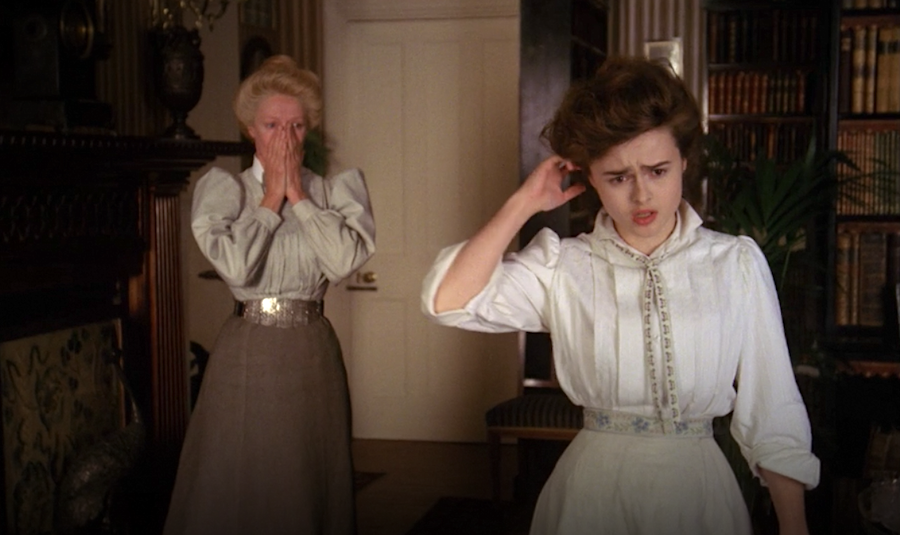
Why did you tell her? What made you?
1:24:21 Lucy, however, is preoccupied with anger at the person she knows must have betrayed her secret. She marches into the house, calls out Charlotte for spilling to Eleanor Lavish (“when you wouldn’t even let me tell Mother!”), and forces her to stand witness to her ensuing confrontation with George. She asks him to leave the house forever. He protests.
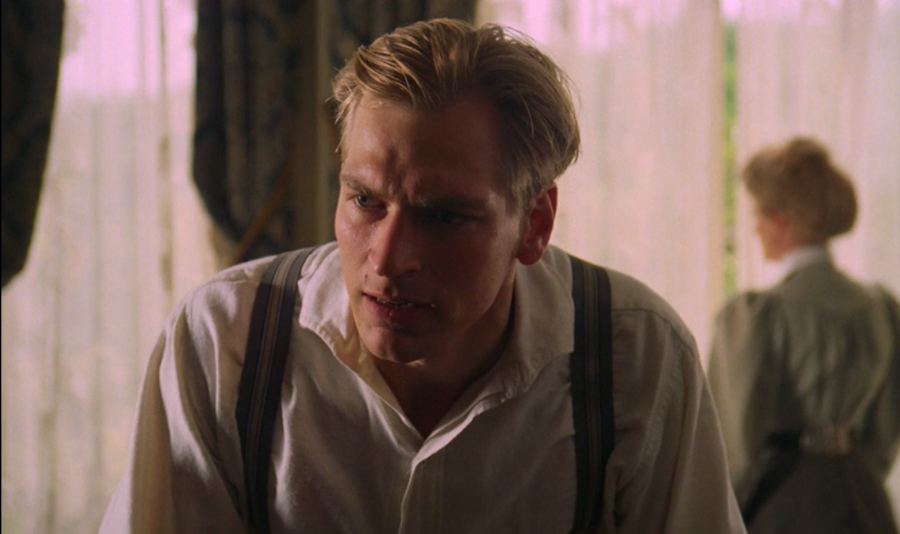
“He wants you for a possession, something to look at, like a painting or an ivory box. Something to own and to display. He doesn’t want you to be real and to think and to live. He doesn't love you. But I love you...”
1:26:00 This is the most we’ve ever heard George speak. He’s eloquent, if a bit mansplainy at times, and of course he’s 100% right about Cecil – all to no avail. Sands delivers George’s entreaties poignantly, but I’m most struck by HBC’s reaction shots as she cycles through Lucy’s shifting expressions of incredulity, anger, and finally stubborn denial.
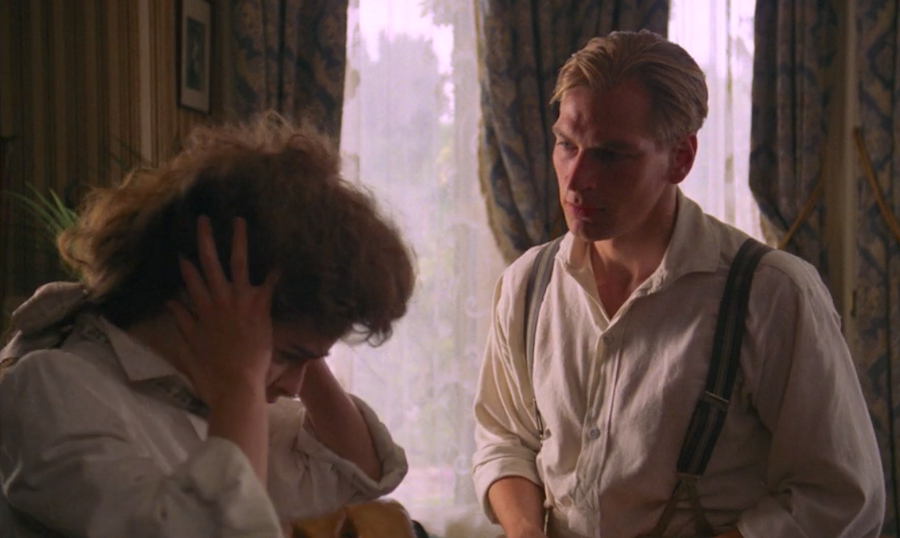
No. No. I will not listen to one more word.
1:27:08 Still, she seems so controlled it isn’t until she suddenly acts like a petulant child, literally stomping her foot and clapping her hands over her ears, that you remember how young she is.
Also fascinating, if more subdued, are her cousin’s reactions during this uncomfortable conversation. Smith conveys with remarkable subtlety genuine remorse and the beginnings of a shift in Charlotte’s attitude towards George. She is, after all, not completely immune to romantic sensibility, as we know from her tête-à-têtes in Italy with Eleanor Lavish.
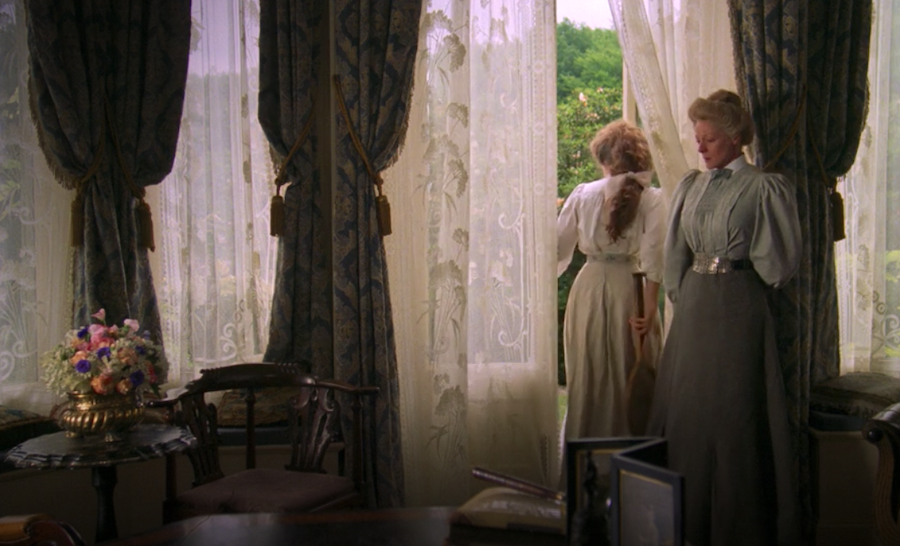
1:27:33 But she is also still Charlotte Bartlett, queen of playing martyr. Of course she’s going to proclaim dramatically, that she will never forgive herself. Lucy’s bone-dry undercutting retort – “You always say that, Charlotte, but you always do forgive yourself” – gets my vote for best burn in a movie that has quite a few of them.
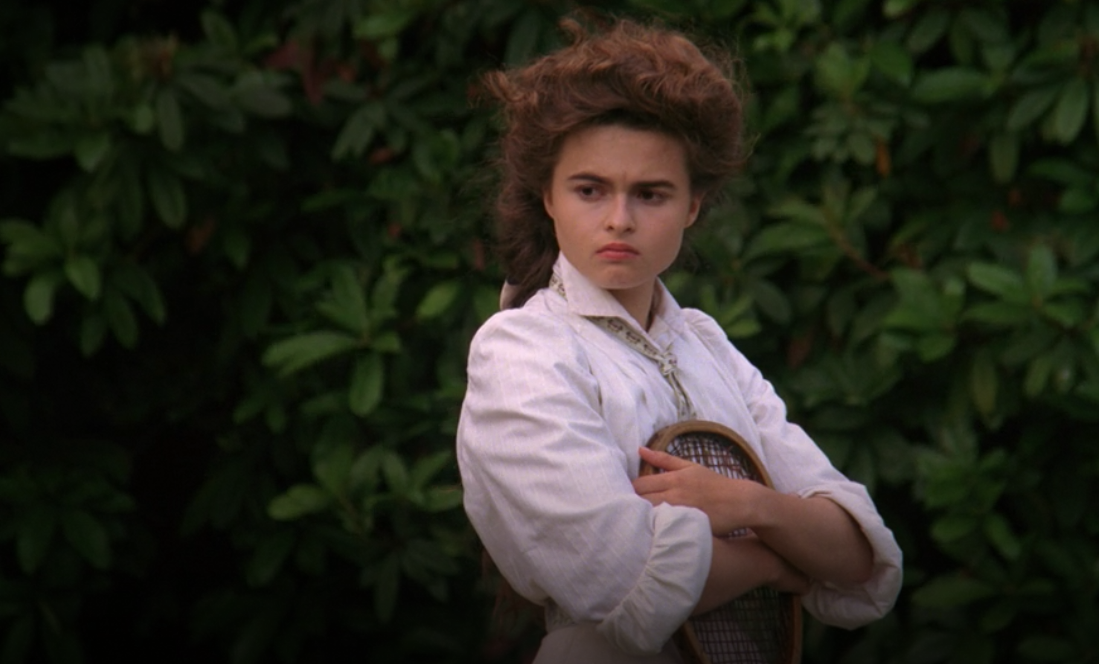
1:28:15 Does Lucy’s dismissal of George mean she’s standing by Cecil – of whom we catch a fleeting comic glimpse during this scene, swatting ineffectually at a fly on the patio? Not at all, and really, who could blame her? As Cecil once again refuses to play tennis, in the most smugly Cecil-ish manner possible, following George’s departure, we see that side-eye again from Lucy. Only this time the scales have fallen fully from her eyes, at least with respect to Cecil.
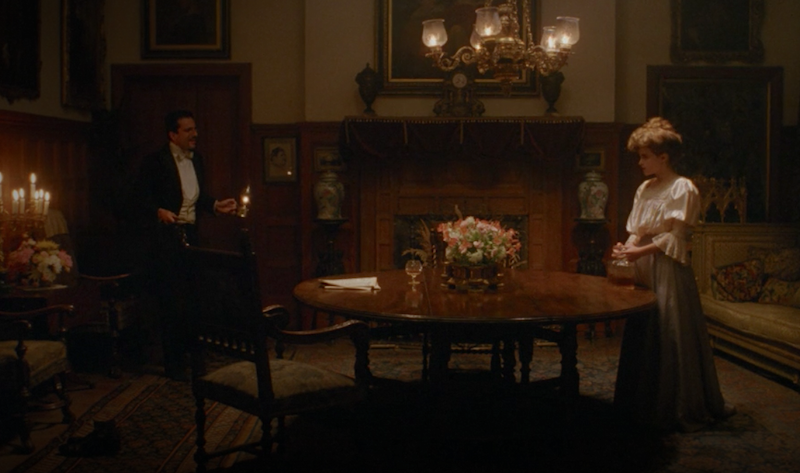
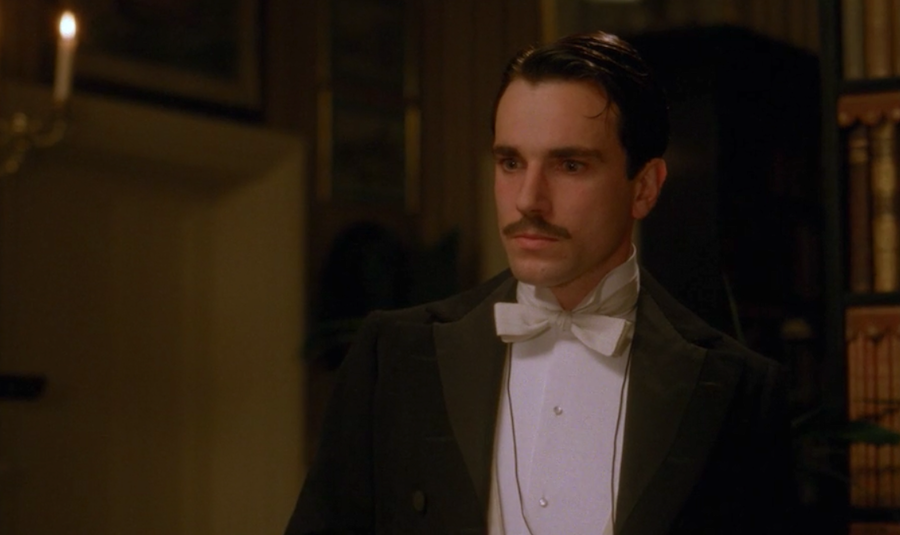
Because I wouldn’t play tennis with Freddy?!”
1:28:45 This, for me, is DDL’s best scene in the movie. Up till now his portrayal of Cecil as an effete snob with an eggshell ego has been as hilarious as it is unflattering, but this is the first time he shows the character’s emotional depths - surprise, they do exist! Blindsided by Lucy’s decision to dump him, he tells her he loves her – but note how once again, like before their disastrous first kiss, he looks around and lowers his voice before saying it, in stark contrast to George’s forthrightness. Still, he looks genuinely shocked when Lucy tells him she never loved him, and even more shocked when she explains why.
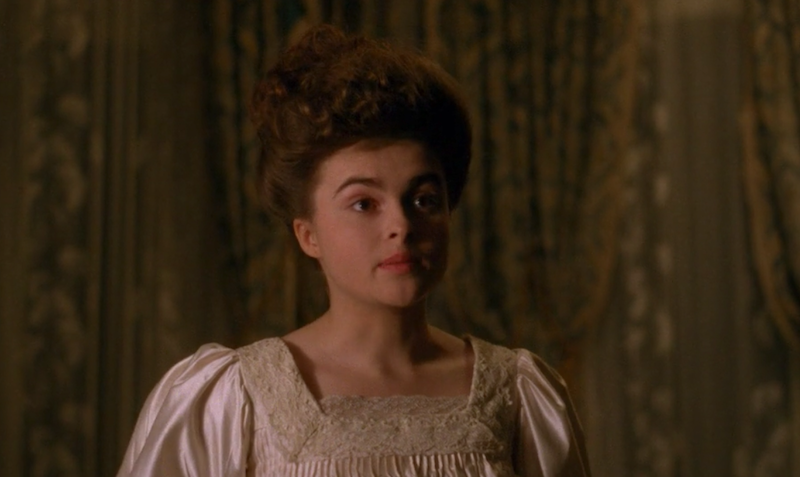
You’re the sort who can’t know anyone intimately, least of all a woman.”
1:30:10 I think it’s supposed to be funny how Lucy parrots the exact words she rejected from George, but I’ve always found it rather grating. Cecil inadvertently underscores the point when he tells her she’s “like a different person, speaking with a different voice” and that he senses “a force in you I hadn’t known of up till now.” Lucy bristles immediately and preemptively denies she’s in love with anyone else…but the lady doth protest too much.
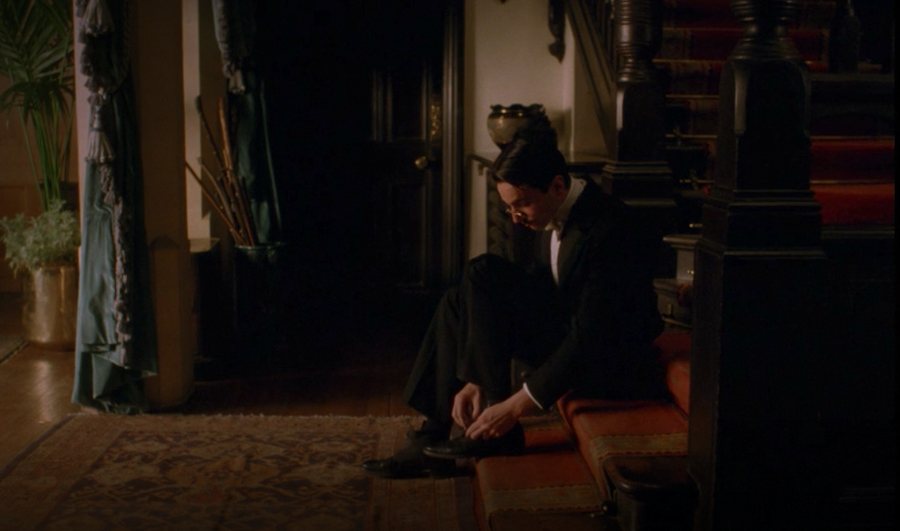
1:32:40 Overall, Cecil takes his psychological beating far more humbly and graciously than we (or Lucy) could have expected. There’s something quite touching about his insisting on lighting the lamp for her and thanking her “for showing me what I really am,” as well as the sight of him silently putting on his shoes. He registers for the first time as a human being rather than a pretentious aesthete.
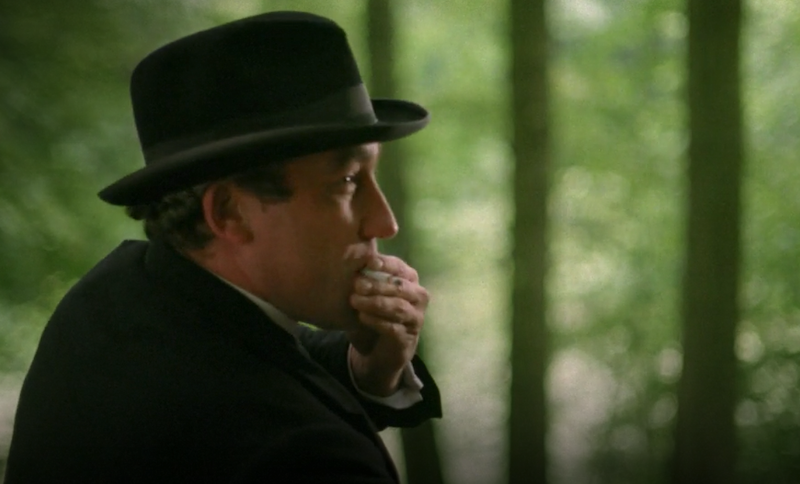
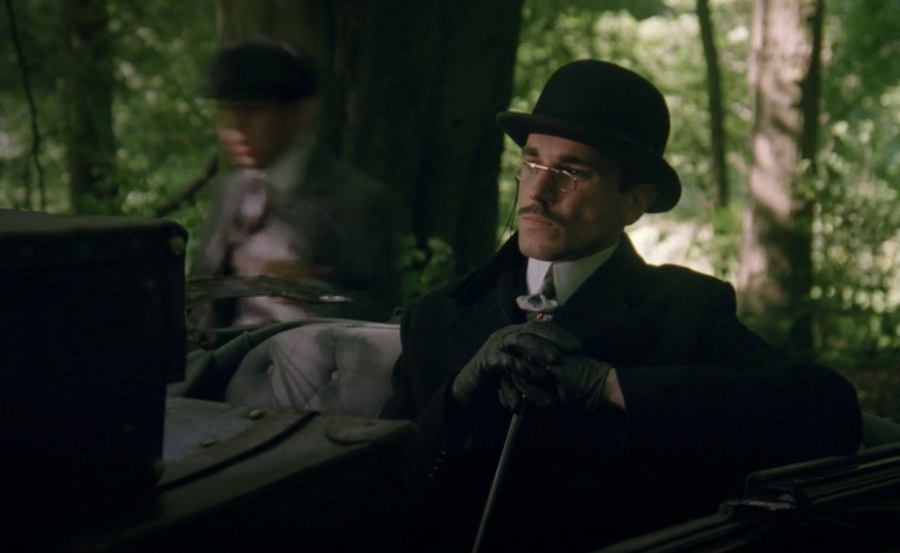
1:34:27 Mr. Beebe looks a bit too pleased at the news from Freddy that Lucy has ditched Cecil. Poor Cecil, meanwhile, has the demeanor of a man at a funeral. Adieu, Cecil - may you have learned something from your ill-fated engagement.
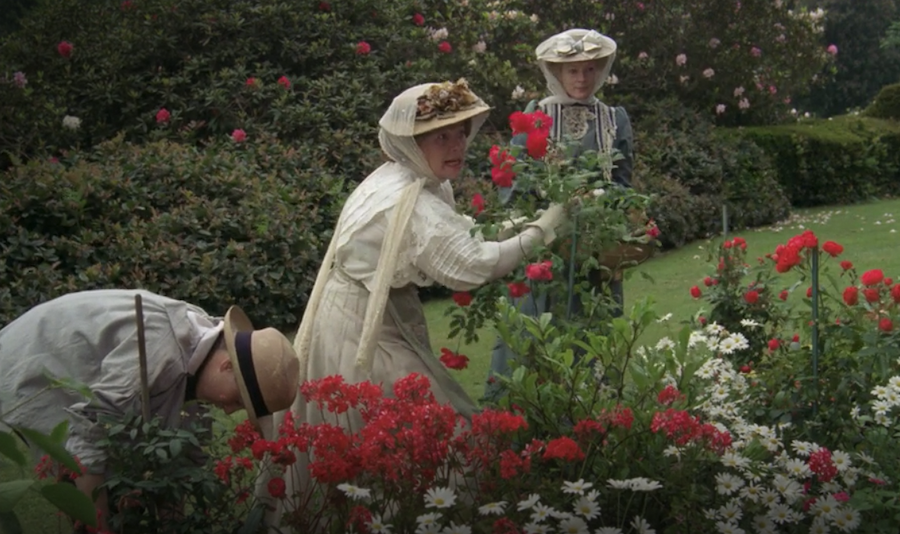
Good gracious, what a mess things are!
1:34:53 The wind is blowing something fierce. A storm is brewing – perhaps metaphorically, too? Mr. Beebe drops by, still chuffed at the news of the Miss Alans going to Greece (and possibly Constantinople). He is, however, quick to perceive Lucy’s distraction and correctly deduces the cause.
Their conversation is weirdly disjointed, as Lucy evades his expressions of support to suddenly, artifically embrace his enthusiasm for the Miss Alans’ travel plans – though in her case it’s clear she has no interest in them except as an opportunity to get out of dodge and avoid the consequences of her actions.
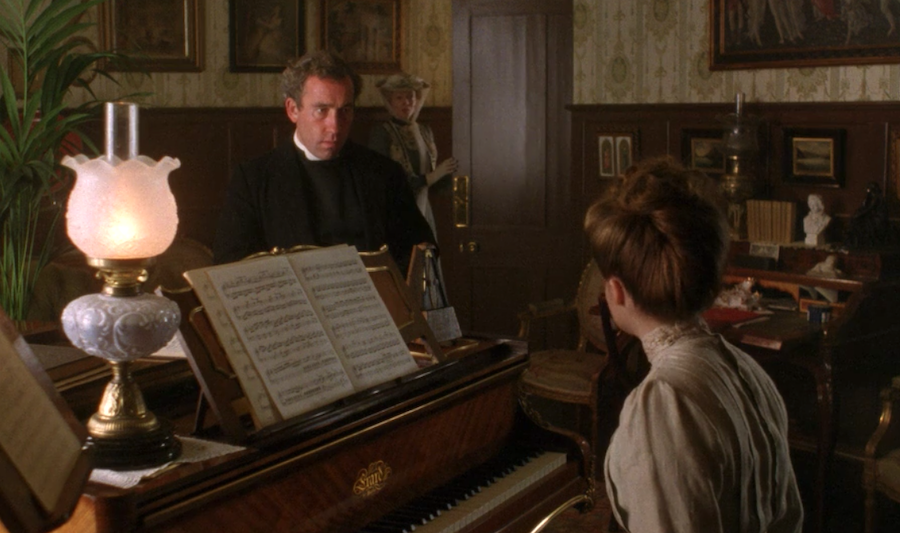
I simply must go away. Don't you see I have to go away?
1:37:03 To that end she enlists Charlotte’s help in convincing Mrs. Honeychurch to let her go to Greece, but Charlotte is ambivalent, even resistant, though she ultimately accedes. Again, one senses something changing in her view of what’s best for Lucy.
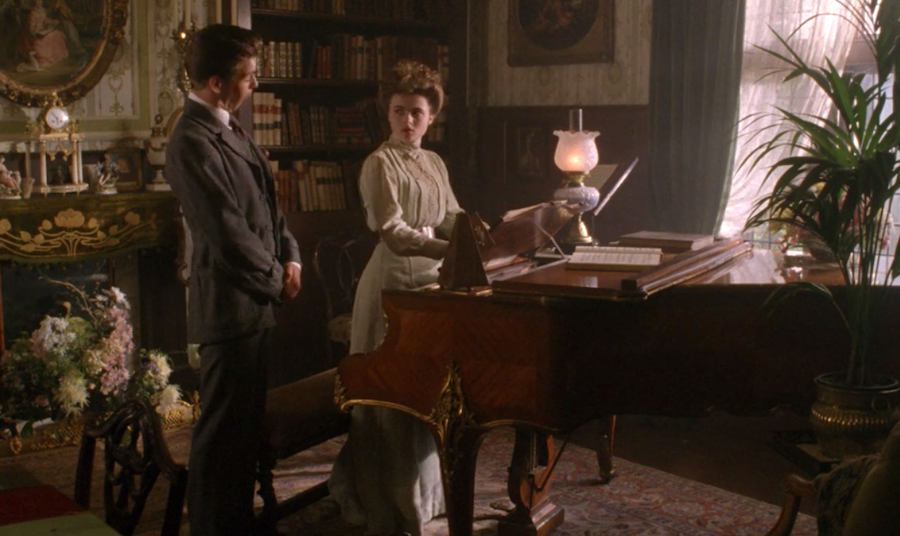
-Why does she look like that?
-Like what?
-Like Charlotte Bartlett.
1:38:30 Of course, she still is Charlotte Bartlett - and gotta say, Freddy does a mean but quite funny impression of her.
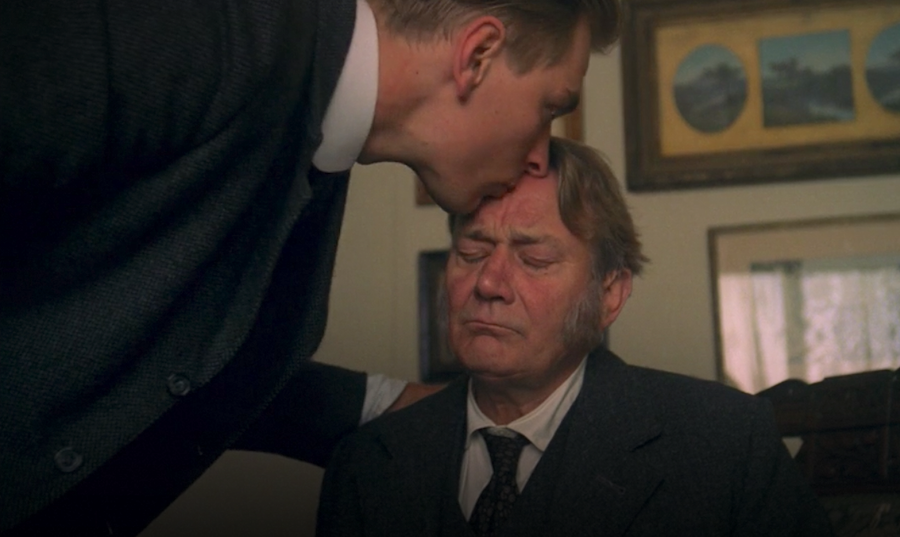
1:40:35 The Emersons are moving out, and Mr. Emerson looks incredibly sad. George is very tender with him before heading out into the rain on his bike – a melancholy counterpoint to the time he joyously ran down a hill in Italy in the rain, so full of love and hope.
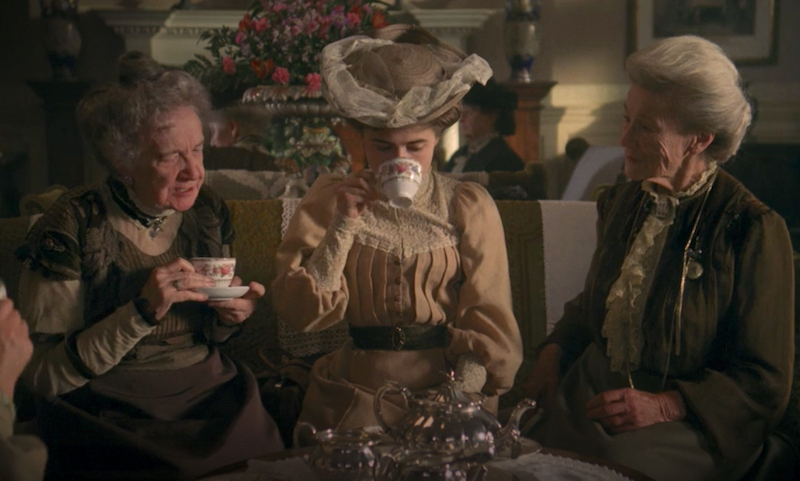
1:41:09 The sight of Lucy sitting in between the Miss Alans, as they take tea under the watchful eye of her mother, always cracks me up. The sisters clearly know something’s up with Lucy’s engagement, even if they’re too polite to say it directly. I love their exchange afterwards about Lucy not looking like a girl who’s about to get married – both Teresa’s killing snark (“And pray, how should a bride-to-be look, according to your great wisdom and experience in these matters?”) and Catherine’s earnest response (“She lacked…radiance”) are perfectly delivered.
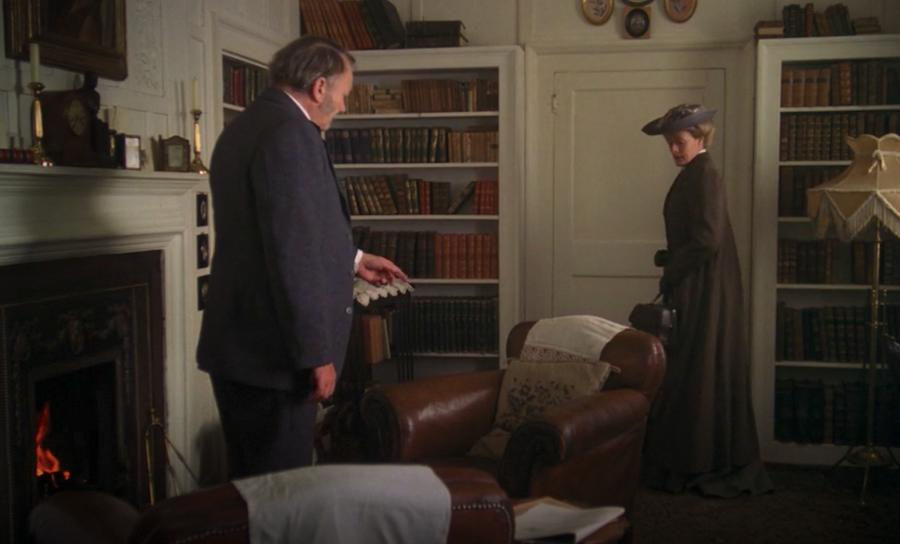
1:44:00 Charlotte finds Mr. Emerson at the vicarage and learns the reason for his sorrowful departure is George’s heartbreak over Lucy. Quite unexpectedly (although not entirely, as I’ve suggested), Charlotte informs him that Lucy has broken it off with Cecil, urging discretion - even though she’s got to know she’s talking to the wrong guy about discretion. Sure enough, the news seems to breathe new life into Mr. Emerson, who actually rubs his hands with glee as he proclaims “There’s a time for keeping quiet, and a time for speaking out!”
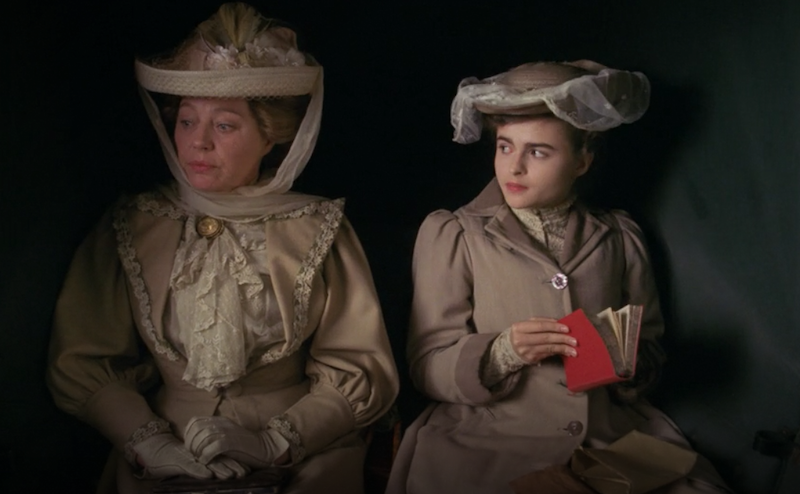
You're tired of Windy Corner and you're tired of Freddy and me."
1:45:36 In contrast, despite her mother’s probing, Lucy’s still not being candid about her real reasons for going to Greece – and Mrs. Honeychurch knows it, though she doesn’t know why. Rosemary Leach doesn’t get as much attention as her co-stars, but I think she’s terrific as Lucy’s mom - such a warm, sensible, down-to-earth presence, you understand why she and Lucy are so close and how keenly she feels the unpleasant novelty of being shut out.
It's interesting that Lucy’s mom should be telling her how like Charlotte she’s becoming just when Charlotte herself is acting in a very un-Charlotte-like way. Perhaps Charlotte is saving Lucy from becoming too much like herself? Lucy asks for the carriage hood to be put down just as they’re passing the villa formerly occupied by the Emersons - and sees the moving van. Is the timing coincidence – or fate?
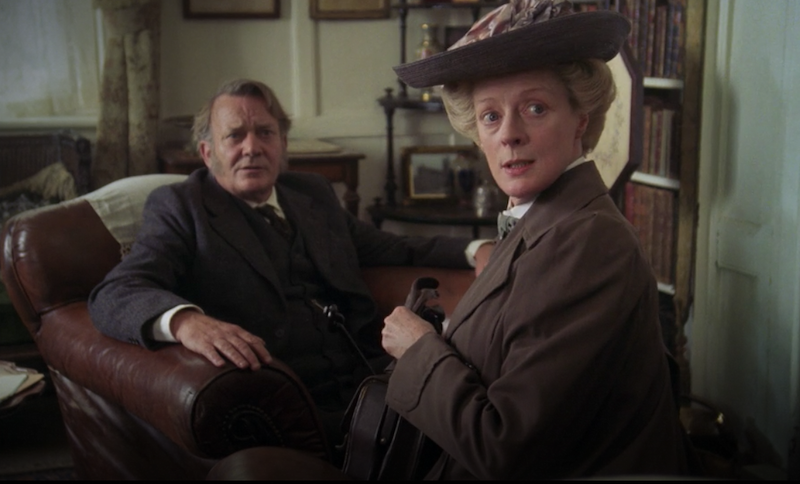
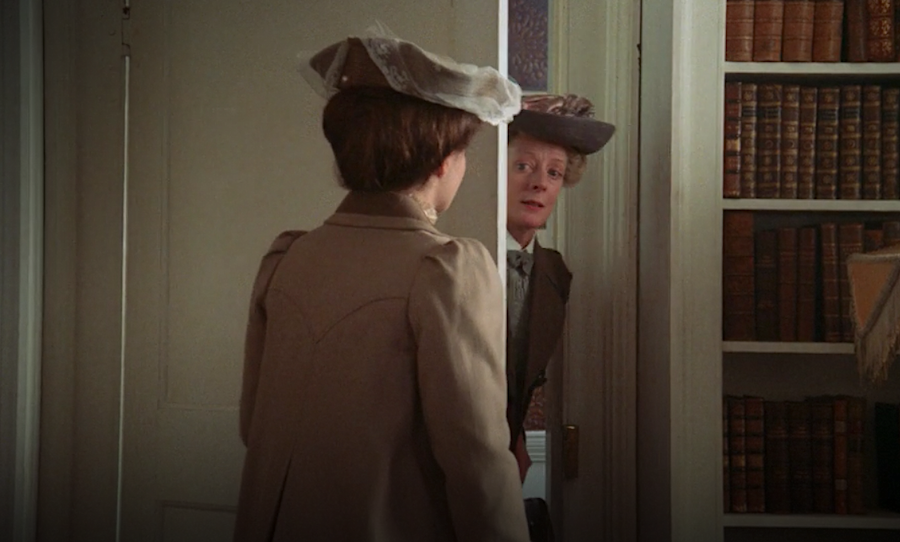
1:47:49 Clearly shellshocked by the Emersons' impending departure, Lucy goes into Mr. Beebe’s house and sees Mr. Emerson and Charlotte together, looking like they’re in cahoots about something. (Which they absolutely are.) Charlotte, for once, knows when to make her exit, and looks positively impish as she shuts Lucy in the study with Mr. Emerson.
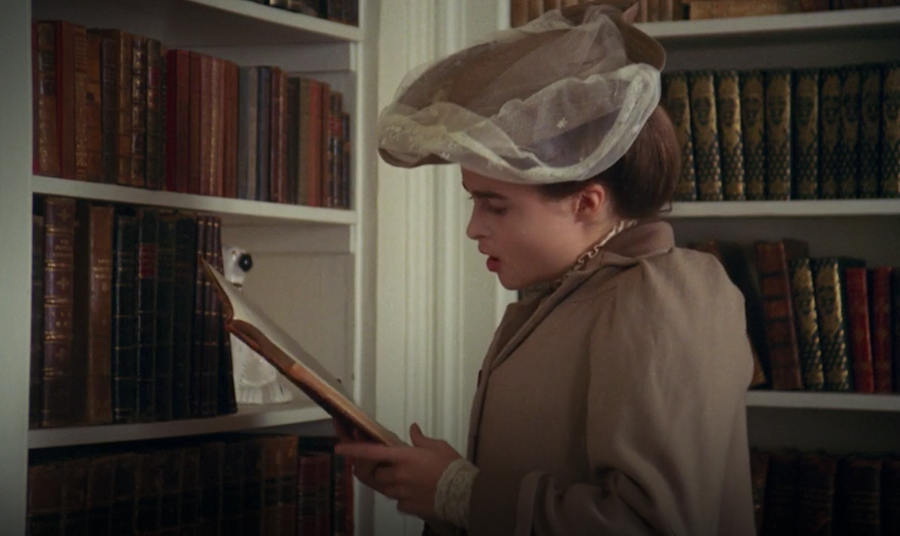
I have no wish to discuss your son or even hear his name mentioned. He has misbehaved from the first.
1:48:47 Trying to keep her composure, Lucy turns the pages of a book (which she belatedly realizes she’s holding upside down, a nice touch) as she accuses George of behaving “abominably.” She’s chastened by Mr. Emerson’s gentle response: “He only tried when he should not have tried.”
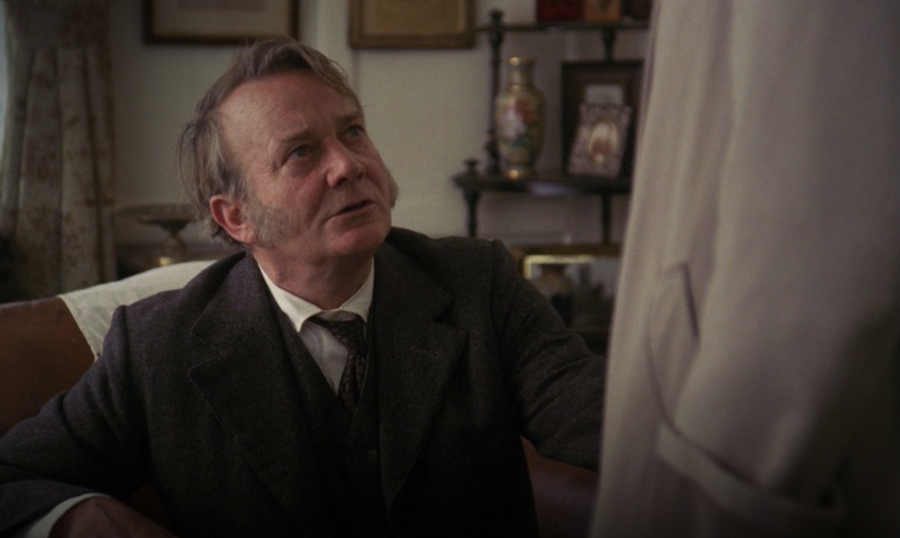
1:50:24 I don’t know what Oscar clip was chosen for Denholm Elliott, but I hope it was something from this scene. In the book, as I recall, Mr. Emerson looks to Lucy almost like a saint or prophet in this moment, and you see that quality here – profoundly compassionate, profoundly inspired – as he practically forces her to realize that the reason she’s been lying to everyone and frantically plotting to go to Greece is because she loves George “body and soul, as he loves you.”
Again, it’s a bit mansplainy – but if anyone ever needed her own feelings to be explained to her, it’s Lucy Honeychurch. Her pitiful sob “But of course I do – what did you all think?” once more reveals her for the confused girl in love she really is.
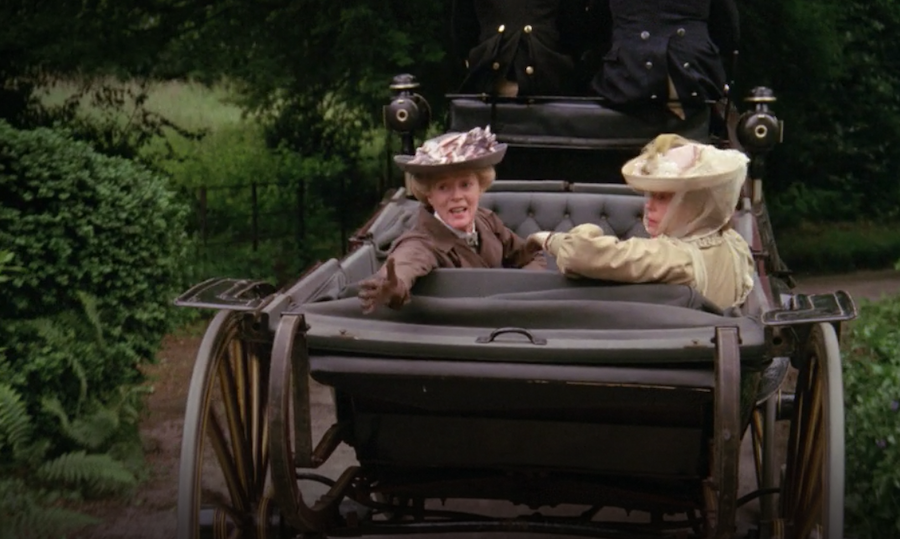
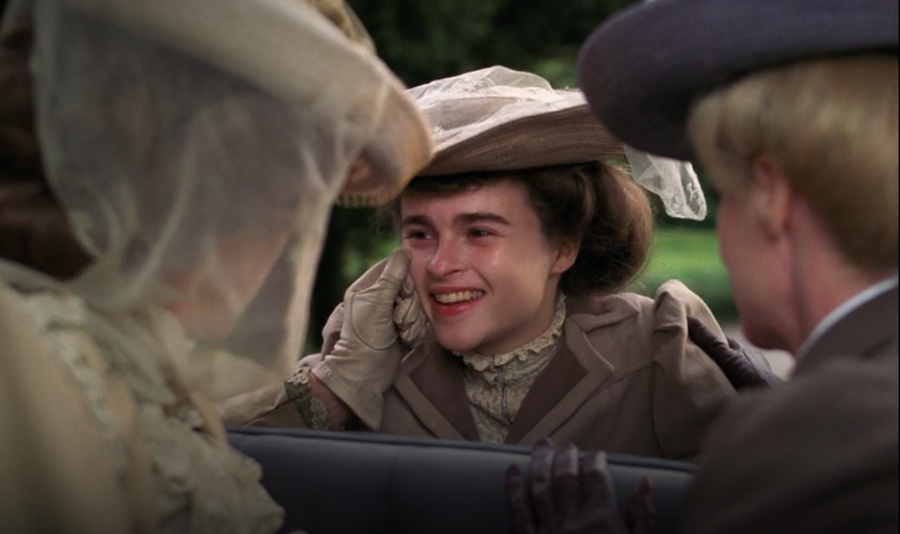
The plan for Greece may be cancelled … Do stop, I think Lucy has something to tell us!”
1:51:13 Another example of the film’s great editing in this quick cut from Charlotte’s bright, expectant look to Lucy’s tearstained but now truly “radiant” countenance... (side note: looks like Lucy is going to let the Miss Alans down again - but somehow I don’t think they’ll mind)
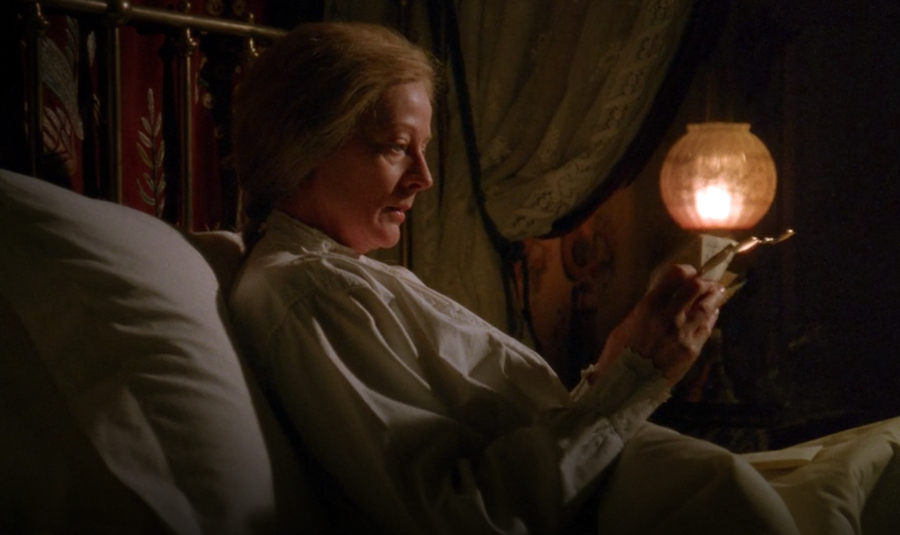
1:51:24 ...back to a scene of Charlotte back home, reading a letter from Lucy, honeymooning with George in Florence. In the book, Charlotte’s role in this happy ending is only suggested as a possibility; here, it’s much more explicit, and there's something wonderfully satisfying about Charlotte Bartlett, the person who forced the lovers apart, being the one to bring them back together. Lucy’s not the only one who’s grown as a person.
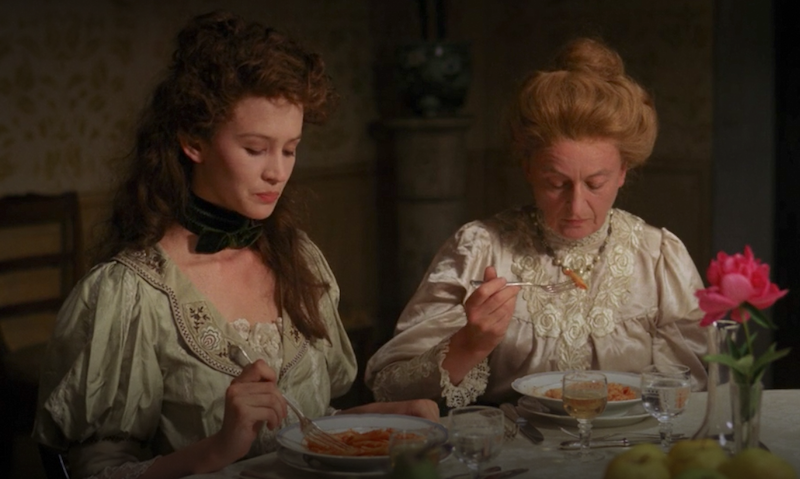
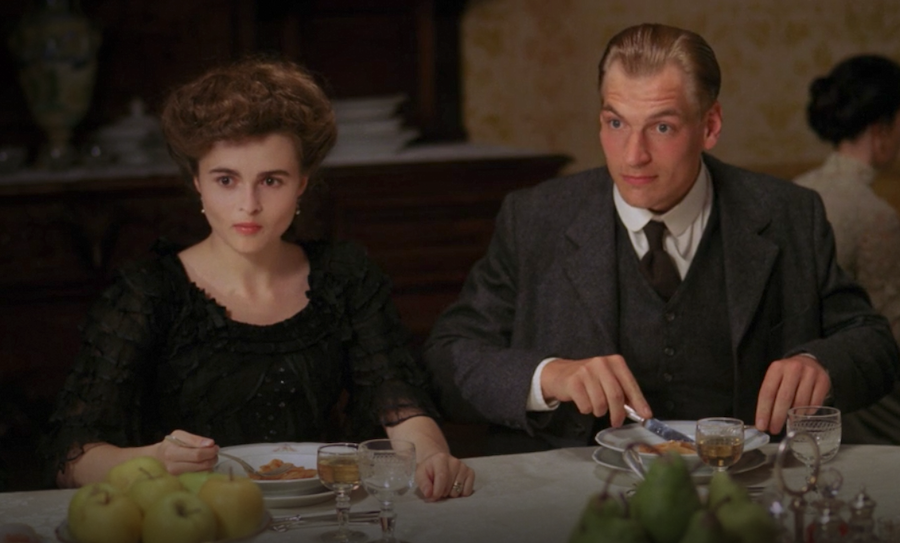
We were promised rooms with a view! It's so unfair.
1:52:00 I used to think that Lucy and George exchanged their rooms with Lucy and Charlotte 2.0, but it’s obvious they kept their view.
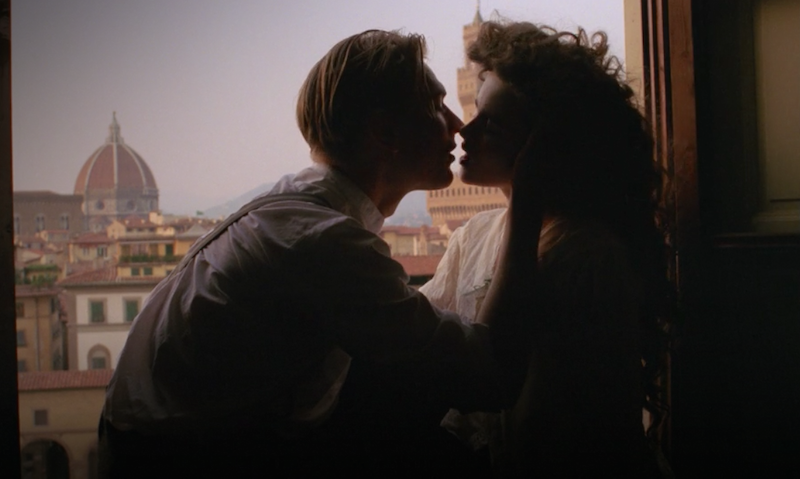
1:52:45 The iconic last shot of them kissing in the window, with the Florence dome in the background, Lucy’s hair loose and wild -- I could write an entire post just on Lucy’s hair in this film -- and the sound of the church bells segueing into the last notes of “O mio babbino caro,” seamlessly combines the romance of their first kiss with the steaminess of their second.
Watching this final scene as a child with my parents used to make me vaguely uncomfortable. As an adult, I realized my discomfort wasn’t because Lucy and George were kissing; it was because they’d clearly been having loads of sex. E.M. Forster, for reasons both obvious and not, wasn’t very successful at conveying this in the novel.
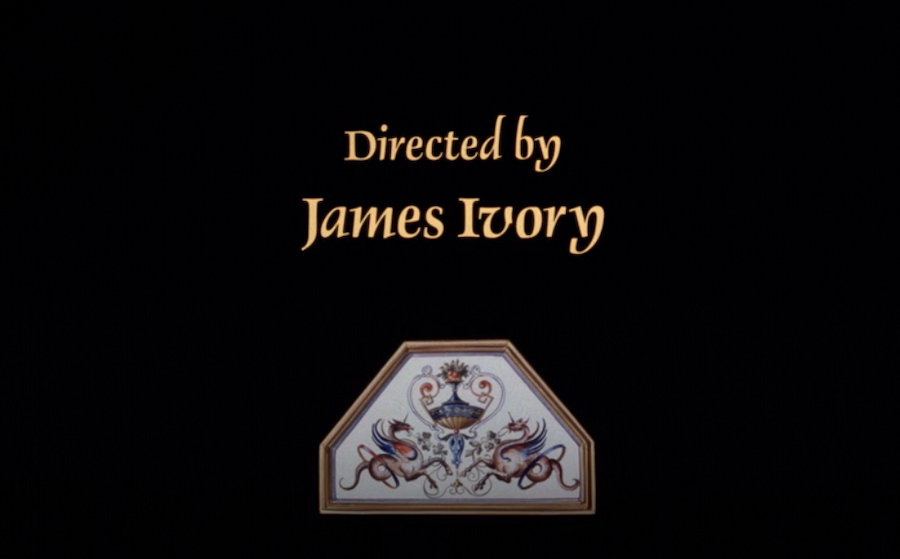
Ivory, Jhabvala, et al. deserve credit for infusing real heat into what could have been, and sometimes gets unfairly characterized as, a handsome but staid period piece. A Room With A View is anything but that, as I hope we’ve shown. It’s sexy, funny, and full of feeling – one of the truly great romantic comedies that only gets better with each viewing.

Related Reading
James Ivory interview - Nathaniel talked to the master about his career in October 2017
Previous Deep Dives
Rebecca (1940), West Side Story (1961), Who's Afraid of Virginia Woolf (1966), Rosemary's Baby (1968), Cabaret (1972), Silence of the Lambs (1991), Thelma & Louise (1991), Aladdin (1992) and A League of Their Own (1992)